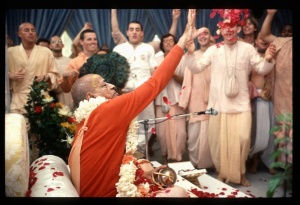CC Adi 6.60 (1975): Difference between revisions
(Vanibot #0027: CCMirror - Mirror CC's 1996 edition to form a basis for 1975) |
(Vanibot #0020: VersionCompareLinker - added a link to the Version Compare feature) |
||
| Line 2: | Line 2: | ||
<div style="float:left">'''[[Sri Caitanya-caritamrta (1975)|Śrī Caitanya-caritāmṛta (1975)]] - [[CC Adi (1975)|Ādi-līlā]] - [[CC Adi 6 (1975)|Chapter 6: The Glories of Śrī Advaita Acārya]]'''</div> | <div style="float:left">'''[[Sri Caitanya-caritamrta (1975)|Śrī Caitanya-caritāmṛta (1975)]] - [[CC Adi (1975)|Ādi-līlā]] - [[CC Adi 6 (1975)|Chapter 6: The Glories of Śrī Advaita Acārya]]'''</div> | ||
<div style="float:right">[[File:Go-previous.png|link=CC Adi 6.58-59 (1975)|Ādi-līlā 6.58-59]] '''[[CC Adi 6.58-59 (1975)|Ādi-līlā 6.58-59]] - [[CC Adi 6.61 (1975)|Ādi-līlā 6.61]]''' [[File:Go-next.png|link=CC Adi 6.61 (1975)|Ādi-līlā 6.61]]</div> | <div style="float:right">[[File:Go-previous.png|link=CC Adi 6.58-59 (1975)|Ādi-līlā 6.58-59]] '''[[CC Adi 6.58-59 (1975)|Ādi-līlā 6.58-59]] - [[CC Adi 6.61 (1975)|Ādi-līlā 6.61]]''' [[File:Go-next.png|link=CC Adi 6.61 (1975)|Ādi-līlā 6.61]]</div> | ||
{{CompareVersions|CC|Adi 6.60|CC 1975|CC 1996}} | |||
{{RandomImage}} | {{RandomImage}} | ||
==== TEXT 60 ==== | ==== TEXT 60 ==== | ||
| Line 12: | Line 11: | ||
:manaso vṛttayo naḥ syuḥ | :manaso vṛttayo naḥ syuḥ | ||
:kṛṣṇa-pādāmbujāśrayāḥ | :kṛṣṇa-pādāmbujāśrayāḥ | ||
:vāco | :vāco 'bhidhāyinīr nāmnāṁ | ||
:kāyas tat-prahvaṇādiṣu | :kāyas tat-prahvaṇādiṣu | ||
</div> | </div> | ||
| Line 27: | Line 26: | ||
<div class="translation"> | <div class="translation"> | ||
"May our minds be attached to the lotus feet of your Lord Kṛṣṇa, may our tongues chant His holy names, and may our bodies lie prostrate before Him. | |||
</div> | </div> | ||
Latest revision as of 19:03, 26 January 2020

His Divine Grace
A.C. Bhaktivedanta Swami Prabhupada
A.C. Bhaktivedanta Swami Prabhupada
TEXT 60
- manaso vṛttayo naḥ syuḥ
- kṛṣṇa-pādāmbujāśrayāḥ
- vāco 'bhidhāyinīr nāmnāṁ
- kāyas tat-prahvaṇādiṣu
SYNONYMS
manasaḥ—of the mind; vṛttayaḥ—activities (thinking, feeling and willing); naḥ—of us; syuḥ—let there be; kṛṣṇa—of Lord Kṛṣṇa; pāda-ambuja—the lotus feet; āśrayāḥ—those sheltered by; vācaḥ—the words; abhidhāyinīḥ—speaking; nāmnām—of His holy names; kāyaḥ—the body; tat—to Him; prahvaṇa-ādiṣu—bowing down to Him, etc.
TRANSLATION
"May our minds be attached to the lotus feet of your Lord Kṛṣṇa, may our tongues chant His holy names, and may our bodies lie prostrate before Him.